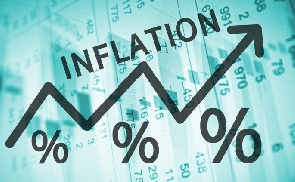Consumer inflation is expected to surpass the 40 percent threshold for an accelerated 17th consecutive month due to the local currency’s depreciation, particularly over the past month, as well as the rise in fuel prices and full effects of utility rates hikes.
Ahead of the official release by Ghana Statistical Services (GSS) today, Wednesday, November 9, 2022, market watchers are anticipating the consumer inflation rate will increase to between 40 and 43 percent.
Under constant cost pressures and cedi depreciation, the country’s headline inflation increased to a multi-year high through the first three quarters of 2022.
In the first nine months of 2022, headline inflation rocketed by an amazing 24.6 percent – reaching a 21-year high of 37.2 percent in September.
Fincap Securities, a market broker, indicated in its weekly analysis of the market that inflation will further rise on the back of recent increases in prices of goods and services, underpinned by energy price hikes, resulting from steep decline in the cedi’s strength toward the end of October.
“We predict the inflation rate will increase to between 40 and 43 percent,” it stated.
The pace of inflation picked up as the GH cedi suffered losses against the US dollar after a wave of sovereign debt downgrades deepened the exchange rate pass-through to inflation.
Also, disruptions to global supply chains due to the Russo-Ukrainian war contributed to increased input and freight costs, increasing the cost of production and filtering into consumer price inflation.
Constant Capital in its weekly review of the market said inflation is anticipated to rise further in the fourth quarter on the back of the higher utility tariffs, appreciation of the US dollar globally with its effects on imported inflation, and the hike in domestic fuel prices. Demand for food ahead of the yuletide season and higher prices for imported food items are also expected to drive up food costs.
On the back of this, Databank in its analysis of the nine months of 2022 and projection for Q4 2022 said: “The increasing global uncertainty makes us pessimistic about inflation for 4Q22. We raise our end-of-2022 inflation projection to 43% ± 100bps due to depreciation and increasing cost pressures”.
The Asset Management Company further stated that the hike in domestic utility tariffs is expected to fan the inflation flame.
The Public Utilities and Regulatory Commission (PURC) sanctioned hikes in electricity (+27.15 percent) and water (+21.55 percent) tariffs after a recommendation from the service providers.
“We believe the tariff hike is yet to translate through prices fully, and remains a significant risk to the inflation outlook,” the investment bank said. “Increments in ex-pump petroleum prices and resultant increases in transport fares will likely exert further inflationary pressure.”
Although global oil prices have been on a downtrend, with Brent crude trading at US$85/bbl to end Sep-22 from US$121/bbl in June 2022, the GH¢ depreciated 38.04 percent YTD in 9M22 against the US$, and fuel prices in Ghana remain on the upswing.
Again, the GPRTU is negotiating to implement a 40 percent increment in transport fares – which is likely to intensify price pressures.
OPEC+ in its October 2022 meeting agreed to cut oil production by 2 million barrels per day (BPD), which is expected to increase oil prices globally.
Business News of Wednesday, 9 November 2022
Source: thebftonline.com













